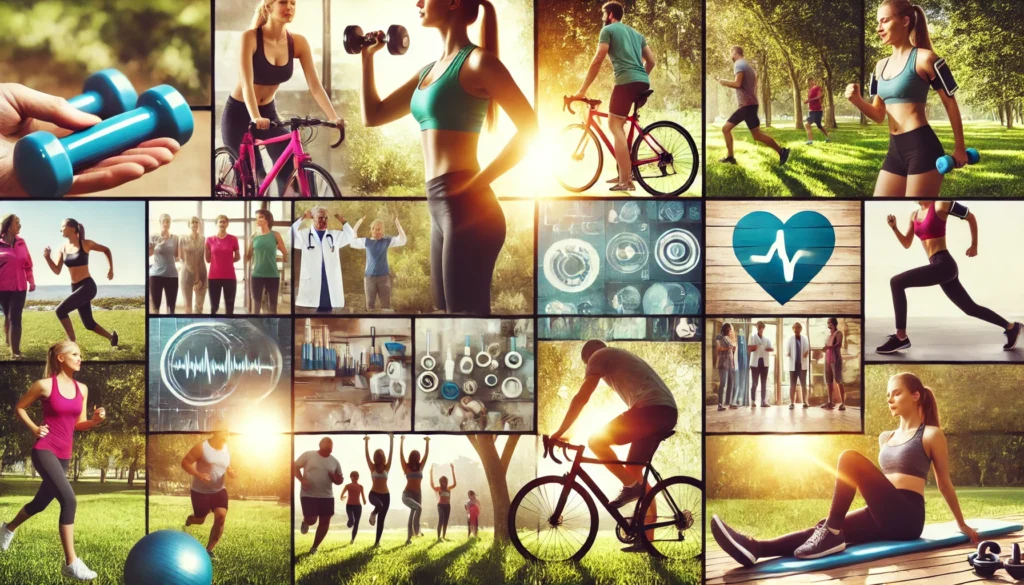Introduction
In today’s fast-paced world, understanding how to get healthy is essential for sustaining not just physical wellness but also optimal cognitive function and increased longevity. Achieving lifelong health requires integrating scientifically validated strategies into daily life, promoting overall well-being and robust brain health. Many individuals wonder, “how can you improve your health” effectively amidst busy schedules and overwhelming information. This comprehensive guide presents evidence-based, actionable insights into how to get healthy and stay healthy, empowering you with the knowledge needed to enhance your health holistically. From nutritional choices and physical activity to cognitive enhancement and longevity, these strategies will transform your lifestyle, enabling a healthier, sharper, and longer life.
You may also like : Best Things for Brain Health: Expert-Backed Strategies to Keep Your Mind Sharp
Prioritizing Nutritional Excellence for Lasting Health
Nutrition is the cornerstone of how to improve your health profoundly and sustainably. Dietary choices directly influence physical health, cognitive function, and longevity, making food one of the most potent tools to enhance your health. Incorporating diverse plant-based foods rich in antioxidants, vitamins, and minerals can significantly lower inflammation and protect against chronic diseases like cardiovascular disease and diabetes. Studies show diets emphasizing fruits, vegetables, whole grains, lean proteins, and healthy fats, such as the Mediterranean diet, are directly linked to enhanced cognitive abilities and slower cognitive decline. When considering how to get healthy through diet, prioritize foods that support the gut-brain axis, like fermented foods, fiber-rich vegetables, and omega-3 fatty acids from fatty fish like salmon and sardines. These dietary habits enhance gut microbiome health, fostering improved mood, memory, and overall cognitive resilience.
Physical Activity as a Pillar of Health and Cognitive Enhancement
Regular physical activity is critical when learning how to get healthy for life, with substantial benefits extending beyond physical fitness to cognitive health and longevity. Exercise increases blood flow to the brain, supporting neurogenesis and brain plasticity, crucial processes for cognitive longevity and reducing the risk of neurodegenerative diseases such as Alzheimer’s and Parkinson’s. Aerobic exercises like running, cycling, and swimming, combined with strength training and flexibility routines, create an optimal fitness regime that enhances both physical stamina and cognitive sharpness. Notably, high-intensity interval training (HIIT) and resistance training are particularly effective at boosting levels of brain-derived neurotrophic factor (BDNF), a protein integral to neuron growth and health. Establishing consistent exercise habits, ideally 150 minutes of moderate-intensity exercise per week, is a foundational strategy for those exploring how can you improve your health holistically.

Optimizing Sleep
The Underrated Pathway to Health and Longevity: Sleep profoundly impacts every aspect of health, from immune function to cognitive clarity, making it crucial in how to get healthy effectively. High-quality sleep supports cognitive performance, emotional stability, and physical regeneration, significantly influencing overall health outcomes. Chronic sleep deprivation can lead to severe health consequences, including increased risk for obesity, diabetes, cardiovascular disease, and cognitive impairment. Implementing sleep hygiene practices such as maintaining a consistent sleep schedule, limiting exposure to screens before bedtime, creating a conducive sleep environment, and using mindfulness techniques like meditation before sleep can dramatically enhance sleep quality. Research indicates that consistently achieving 7-9 hours of restful sleep nightly boosts cognitive functions, such as memory consolidation, problem-solving abilities, and emotional resilience, substantially contributing to longevity and overall health.
Mindfulness and Stress Management for Cognitive Enhancement
Stress management is often overlooked but pivotal in discussions on how to improve your health and longevity. Chronic stress contributes to inflammation, impaired cognitive function, and accelerated aging, underscoring the necessity of effective stress-reduction strategies for long-term health. Mindfulness practices, including meditation, yoga, and deep-breathing exercises, significantly reduce stress levels and enhance emotional regulation. Neuroscientific studies validate that regular mindfulness practice positively alters brain structure, particularly in areas associated with attention, emotion regulation, and memory. These cognitive benefits translate into improved mental health, reduced anxiety and depression, and increased resilience against age-related cognitive decline. Mindfulness is thus a powerful, scientifically supported method to enhance your health, supporting longevity through sustained cognitive and emotional health.
Building Social Connections to Support Cognitive and Physical Health
Social relationships and connectivity significantly influence health, cognitive function, and lifespan. Extensive research highlights the link between strong social networks and lower risks of cognitive decline, cardiovascular disease, and even increased longevity. Humans are inherently social beings, and meaningful interactions stimulate mental engagement, emotional satisfaction, and resilience against stress. Engaging regularly in social activities, nurturing friendships, and participating in community or group activities provides essential psychological and emotional support, fostering a sense of belonging crucial for mental health. Moreover, social interactions stimulate cognitive processes, supporting memory retention and problem-solving skills, directly influencing brain health positively. Prioritizing social connectivity is thus a compelling and often underestimated approach to sustainably enhance your health and extend your healthy lifespan.

Frequently Asked Questions (FAQ)
1. What are advanced strategies on how to improve my health through dietary supplements?
Choosing scientifically validated dietary supplements can enhance your health significantly when tailored to your individual needs. Supplements such as curcumin, resveratrol, and NAD+ precursors like nicotinamide riboside show promising results in promoting longevity and cognitive function. Integrating adaptogens, including ashwagandha or rhodiola rosea, can also help manage stress, supporting overall health. Always consult healthcare professionals before starting new supplements to ensure compatibility with your health status and medications. Additionally, regular blood tests can help tailor supplement use precisely to your nutritional needs.
2. Can intermittent fasting help enhance your health, especially cognitive functions?
Intermittent fasting (IF) is a powerful tool to enhance your health, particularly in boosting cognitive performance. IF stimulates autophagy, a cellular renewal process that may reduce age-related cognitive decline and enhance memory. It also promotes insulin sensitivity, potentially reducing risks associated with cognitive impairment and neurodegenerative conditions. However, intermittent fasting should be customized to your lifestyle and health status, considering factors like energy demands and hormonal balance. Consulting a nutritionist can help optimize IF practices tailored specifically to your health goals.
3. How can you improve your health through technology without causing information overload or stress?
Leveraging technology mindfully can effectively enhance your health by tracking habits, health metrics, and cognitive functions without overwhelming you. Utilizing apps for meditation, sleep tracking, and cognitive training can foster better health outcomes if integrated thoughtfully into your routine. Set clear boundaries on technology usage to avoid digital fatigue and prioritize apps with science-backed health benefits. Periodic digital detoxes, complemented by manual tracking methods, can also balance technological benefits and emotional well-being. Opting for fewer but highly reliable tech tools can streamline your health improvement journey effectively.
4. How does personalized medicine help in determining how to get healthy for life?
Personalized medicine transforms traditional approaches by providing tailored health strategies based on genetic profiling and biomarkers, greatly informing how to get healthy sustainably. This individualized approach allows for precision in dietary recommendations, exercise plans, and preventive healthcare. Genetic testing can reveal specific dietary intolerances or predispositions, enabling proactive health management. Continuous advances in personalized medicine, such as pharmacogenomics, offer tailored drug therapies that minimize adverse effects. Collaborating with genetic counselors or specialized physicians can maximize the potential of personalized healthcare strategies.
5. Are there specific cognitive-enhancing activities that can supplement physical exercise when determining how to get healthy?
Yes, cognitive training exercises such as puzzles, memory games, strategic board games, and language learning significantly complement physical activities in enhancing brain health. Activities demanding complex cognitive tasks, such as musical instrument playing or new languages, foster neural plasticity and resilience against cognitive decline. Virtual reality (VR) applications designed for cognitive training are emerging as innovative tools offering immersive and effective brain-stimulating experiences. Combining cognitive exercises with regular physical activity creates a powerful synergy, dramatically improving overall cognitive function and mental acuity. Structured cognitive programs are beneficial and can easily integrate into everyday routines.
6. How can workplace wellness programs be optimized to effectively enhance your health?
Workplace wellness programs effectively enhance your health when they are holistic, personalized, and foster an engaging culture of health. Effective programs extend beyond basic offerings like fitness memberships, integrating stress management, nutritional counseling, and mindfulness training. Employee participation significantly increases when wellness initiatives are integrated seamlessly into daily work routines and actively supported by management. Regular assessments and employee feedback ensure the programs remain relevant, impactful, and tailored to evolving health needs. Implementing incentives such as recognition or tangible rewards can boost participation rates and long-term commitment.
7. What role do microbiome interventions play in how to improve my health comprehensively?
Targeted microbiome interventions, including probiotics, prebiotics, and dietary adjustments, offer novel strategies to improve your health profoundly, particularly regarding digestive and mental health. Emerging research highlights gut microbiota’s extensive influence on mood regulation, immune response, and cognitive functions. Personalizing microbiome interventions through microbiome testing ensures more precise and effective health outcomes. Incorporating fermented foods regularly into your diet can naturally foster beneficial gut bacteria, supporting overall health and resilience against disease. Consulting microbiome specialists can optimize these interventions to your unique biological profile and health objectives.
8. Can wearable health trackers significantly enhance your health, and how accurate are they?
Wearable health trackers can substantially enhance your health by providing consistent, real-time feedback on activities, sleep quality, and vital metrics. Advanced trackers now offer features like heart rate variability (HRV) monitoring, oxygen saturation tracking, and stress measurement, enabling nuanced health management. While not medically diagnostic, high-quality trackers offer accuracy sufficient for effectively guiding lifestyle adjustments and monitoring long-term health trends. Ensuring device calibration, consistent usage, and interpreting data contextually with professional guidance maximize their health-enhancing potential. Integrating tracker data with professional medical advice can significantly optimize your health improvement strategy.
9. How can community involvement and volunteering positively impact how to get healthy mentally and emotionally?
Community involvement and volunteering provide substantial emotional and psychological benefits, positively affecting mental health by reducing feelings of isolation and enhancing self-esteem. Participating in meaningful volunteer activities fosters a sense of purpose, significantly enhancing overall emotional well-being and resilience against mental health disorders. It also promotes cognitive stimulation through social interactions, aiding cognitive longevity and emotional health. Regularly engaging in community service or volunteering activities can also lead to reduced stress levels, indirectly promoting physical health. Actively seeking volunteering opportunities aligned with personal values further amplifies these benefits.
10. Is there a role for creative activities, like art or music, in strategies on how to get healthy?
Creative pursuits like art and music have substantial roles in health improvement strategies, positively influencing emotional, cognitive, and even physical health. Creative expression reduces stress hormones, promotes relaxation, and enhances emotional resilience, essential for holistic health. Activities such as painting, writing, or playing musical instruments encourage brain plasticity and cognitive flexibility, contributing to long-term cognitive health. Group-based creative activities further boost health by fostering social interactions, reinforcing emotional connections, and enhancing social well-being. Regularly incorporating creative activities into your routine supports comprehensive wellness, significantly complementing traditional approaches to getting healthy.

Conclusion: Embracing Lifelong Health and Cognitive Vitality
Understanding how to get healthy for life involves a multifaceted, scientifically validated approach encompassing nutrition, physical activity, sleep optimization, mindfulness, and social connectivity. These elements synergistically enhance your health, cognitive abilities, and longevity, creating a robust foundation for lifelong wellness. Embracing these strategies not only optimizes physical and cognitive health but significantly elevates quality of life. Incorporating these practical, scientifically grounded insights into daily routines empowers individuals to live healthier, more vibrant, and intellectually fulfilling lives. Prioritize these lifestyle adjustments today, recognizing that the decisions you make now profoundly impact your health trajectory, cognitive clarity, and longevity in the years to come.
lifelong wellness tips, cognitive health strategies, longevity lifestyle choices, nutritional excellence, physical fitness benefits, holistic health practices, sleep hygiene advice, mindful stress reduction, social connectivity health, brain plasticity exercises, intermittent fasting benefits, personalized medicine insights, microbiome health, wearable health technology, emotional wellness activities, creative health therapies, workplace wellness solutions, dietary supplement guidance, community involvement health, healthy aging strategies
Further Reading:
A four-day science-backed guide to forging better friendships that will improve your life
The Stress Reset: 5 Simple, Science-Backed Ways to Boost Your Mental Health
7 Smart Strategies to Boost Your Brain Health in the New Year
Disclaimer
The information contained in this article is provided for general informational purposes only and is not intended to serve as medical, legal, or professional advice. While Health11News strives to present accurate, up-to-date, and reliable content, no warranty or guarantee, expressed or implied, is made regarding the completeness, accuracy, or adequacy of the information provided. Readers are strongly advised to seek the guidance of a qualified healthcare provider or other relevant professionals before acting on any information contained in this article. Health11News, its authors, editors, and contributors expressly disclaim any liability for any damages, losses, or consequences arising directly or indirectly from the use, interpretation, or reliance on any information presented herein. The views and opinions expressed in this article are those of the author(s) and do not necessarily reflect the official policies or positions of Health11News.


